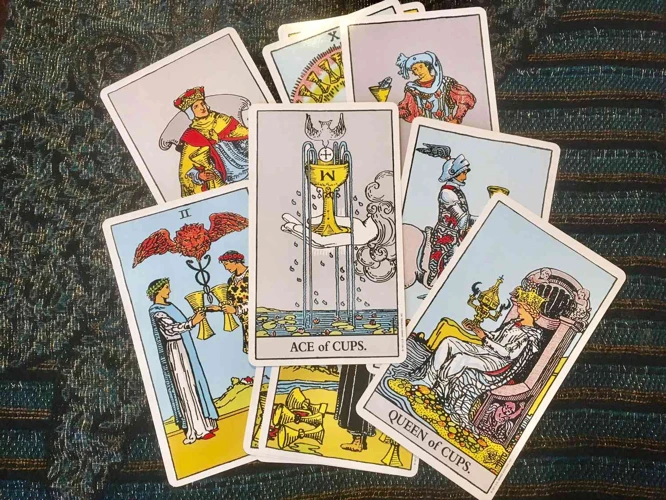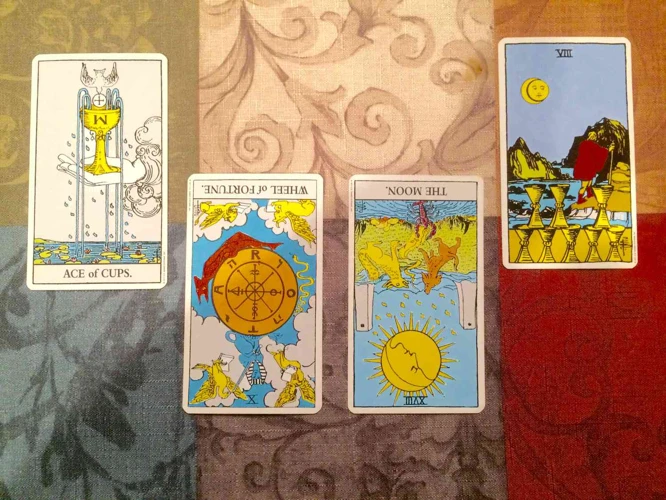Today, we delve into the mystical world of Tarot cards, specifically focusing on the captivating Cups suit. While many are familiar with the traditional meanings of these cards, we will be exploring the lesser-known, enigmatic realm of their reversed interpretations. Prepare to have your perspective shifted as we uncover the hidden depths and alternate messages contained within each Cups card. From the ethereal Ace of Cups to the powerful King of Cups, we will embark on a journey of discovery, shedding light on the mysterious significance of Cups cards when they appear upside down. So, let us venture forth and unlock the secrets that lie within the reversed meanings of Cups cards in Tarot.
Contents
- Overview of Cups Cards in Tarot
- Understanding Reversed Cards in Tarot
-
Exploring the Reversed Meanings of Cups Cards
- 1. Reversed Ace of Cups
- 2. Reversed Two of Cups
- 3. Reversed Three of Cups
- 4. Reversed Four of Cups
- 5. Reversed Five of Cups
- 6. Reversed Six of Cups
- 7. Reversed Seven of Cups
- 8. Reversed Eight of Cups
- 9. Reversed Nine of Cups
- 10. Reversed Ten of Cups
- 11. Reversed Page of Cups
- 12. Reversed Knight of Cups
- 13. Reversed Queen of Cups
- 14. Reversed King of Cups
- Conclusion
-
Frequently Asked Questions
- 1. Can reversed Cups cards in Tarot indicate a loss of emotional fulfillment?
- 2. Do reversed Cups cards always have negative meanings?
- 3. Are reversed Cups cards related to self-reflection and inner work?
- 4. Can reversed Cups cards symbolize a need for emotional boundaries?
- 5. Do reversed Cups cards indicate a lack of emotional communication?
- 6. Can reversed Cups cards represent unresolved emotional issues from the past?
- 7. Do reversed Cups cards suggest the need for self-care and self-love?
- 8. Can reversed Cups cards represent hidden emotions or repressed feelings?
- 9. Do reversed Cups cards suggest the need for emotional healing or therapy?
- 10. Can reversed Cups cards indicate a journey towards emotional fulfillment?
- References
Overview of Cups Cards in Tarot

The Cups suit holds a special place in the mystical realm of Tarot, representing emotions, intuition, and deep connections. These cards are deeply intertwined with the element of water, symbolizing the ebb and flow of our inner lives. Each card in the Cups suit tells a unique story, captivating us with its imagery and evoking powerful emotions. The Ace of Cups opens the floodgates of love and new beginnings, while the Two of Cups celebrates soulmate connections and balance in relationships. The Cups suit carries with it a sense of introspection and vulnerability, urging us to dive deeper into our own emotional landscapes and connect with our true selves. From the enchanting allure of the Three of Cups to the melancholic introspection of the Five of Cups, each card carries its own unique energy and message. Understanding the Cups cards is essential for anyone seeking guidance on matters of the heart and the realm of emotions.
1. The Suit of Cups
The Suit of Cups is one of the four suits in a standard Tarot deck and holds a significant place in the realm of divination. Representing emotions, intuition, relationships, and the realm of the subconscious, the Cups suit delves deep into the waters of our innermost feelings. Each card in this suit is adorned with mystical imagery and symbols that speak to the complexities and depths of our emotional lives. Linked to the element of water, the suit of Cups flows with the ebb and flow of our innermost experiences, inviting us to explore the depths of our emotions and connect with our intuitions. Water is a symbol of the unconscious mind, intuition, and healing, making the Cups suit a powerful tool for self-reflection and understanding. It offers deep insight into our emotional well-being, relationships, and spiritual growth. The Cups suit encompasses a wide range of emotions, ranging from love, joy, and harmony to loneliness, heartbreak, and sorrow. By examining the cards in this suit, we gain profound insights into our emotional landscapes, helping us navigate the labyrinth of our hearts with wisdom and clarity.
2. Significance of Cups Cards
The Cups cards in Tarot hold immense significance, offering profound insights into the realm of emotions, relationships, and intuition. Representing the element of water, these cards symbolize the flow of our feelings and the depths of our inner world. Each Cups card carries its own unique energy and message, providing guidance and wisdom on matters of the heart. The significance of Cups cards lies in their ability to tap into our emotional landscape, revealing truths, and offering a mirror to our deepest desires and fears. Whether it’s the loving embrace of the Two of Cups or the bittersweet nostalgia of the Six of Cups, each card paints a vivid picture of our emotional experiences and relationships. The Cups suit is a reservoir of healing and spirituality, encouraging self-reflection and personal growth. Through the symbolism and imagery present in the Cups cards, we are invited to explore the delicate dance of our emotions and the power of intuition. These cards remind us to honor our feelings and listen to the whispers of our hearts. In understanding the significance of Cups cards, we unlock a gateway to self-discovery and gain valuable insights into our emotional well-being.
Understanding Reversed Cards in Tarot

In Tarot readings, reversed cards add an intriguing layer of complexity and offer alternative interpretations to their upright counterparts. Reversed cards occur when a card appears upside down, signaling a shift in energy and meaning. While upright cards often represent positivity and forward motion, reversed cards like the reversed Ace of Cups or the reversed Queen of Cups introduce a new dimension of introspection, challenges, or blocked energies. These reversed meanings can indicate a need for introspection, a warning to pay attention to certain areas of life, or a reminder to approach situations with caution. By understanding the significance of reversed cards, Tarot readers gain a deeper understanding of the intricacies and nuances within a reading, allowing for a more comprehensive and insightful interpretation of the cards’ messages.
1. Reversed Cards Explained
When it comes to Tarot readings, the appearance of a reversed card can significantly alter the meaning and interpretation of a reading. Reversed cards, also known as upside-down cards, indicate a shift in energy or a disruption of the upright card’s energy. While upright cards often represent the positive aspects and potential of a situation, reversed cards bring forth challenges, blockages, or a need for reflection and growth. Each card has its own unique reversed meaning, adding depth and complexity to the Tarot reading. When a card appears reversed, it can signify a need for caution, a warning, or a call to explore the shadow aspects of the card’s symbolism. Reversed cards should not be viewed as negative omens but rather as opportunities for growth and self-awareness. They offer a chance to examine obstacles, uncover hidden truths, and assess the areas in our lives that require examination or release. By embracing the reversed cards and their messages, we can gain profound insights and navigate the twists and turns of life with wisdom and grace.
2. Importance of Reversed Meanings
Tarot cards are not merely divinatory tools; they are gateways into the subconscious and mirror our deepest thoughts and emotions. When a card appears reversed, it carries a unique and significant meaning that cannot be ignored. The importance of reversed meanings lies in their ability to provide an additional layer of insight and depth to a reading. In traditional Tarot interpretations, reversed cards often indicate blockages, delays, or a shift in energy. They challenge us to explore hidden aspects of ourselves or the situation at hand. Reversed meanings can reveal the presence of resistance, internal conflicts, or unaddressed issues that need attention. By paying attention to reversed cards, we gain a more comprehensive understanding of the nuances and complexities of the reading. They offer us an opportunity for growth, highlighting areas where we can bring about positive change and transformation. Ignoring the reversed meanings would be akin to overlooking half the story. It is through embracing the reversed interpretations that we can unlock a wealth of wisdom and guide ourselves towards a more conscious and fulfilling path.
Exploring the Reversed Meanings of Cups Cards
In the intricate tapestry of Tarot, the reversed meanings of Cups cards add a whole new layer of depth and complexity to our interpretation. Let us embark on an exploration of the reversed Cups cards, where the familiar symbolism takes on a different shade, challenging our perceptions and inviting us to look within. The Reversed Ace of Cups, for instance, may signify blocked emotions or a missed opportunity for emotional fulfillment. Meanwhile, the Reversed Two of Cups can indicate disharmony or imbalance in relationships. The Reversed Three of Cups might suggest a lack of celebration or disconnection from a supportive community. As we journey through the Reversed Cups suit, we encounter moments of introspection, missed connections, and emotional stagnation. It is through understanding these reversed meanings that we can delve deeper into the complexities of the human experience and gain valuable insight into our emotional landscapes.
1. Reversed Ace of Cups
The reversed Ace of Cups in Tarot signifies a temporary blockage in emotional fulfillment and a sense of unrequited love. This card suggests that you may be experiencing difficulties in forming deep connections or finding joy in your relationships. It could indicate a period of emotional emptiness, where you may feel disconnected from your own feelings or unable to express them authentically. The reversed Ace of Cups encourages self-reflection, urging you to explore any emotional barriers that may be preventing the flow of love and happiness in your life. It could be a signal that you need to focus on healing past emotional wounds and practicing self-care. Take this time to delve into your own emotions and nurture yourself before seeking to establish meaningful connections with others. Remember, the reversed Ace of Cups is not a permanent state, but rather a call to introspection and emotional growth.
2. Reversed Two of Cups
The reversed Two of Cups in Tarot brings a shift in the energy of divine partnerships and harmonious connections. When this card appears upside down, it signifies a disruption or imbalance in a romantic relationship or deep bond. It could indicate a lack of emotional reciprocity, miscommunication, or unresolved conflicts. In relationships, the reversed Two of Cups urges you to reevaluate your emotional needs and the level of commitment from both parties. It suggests that there may be underlying issues of codependency, possessiveness, or a loss of emotional intimacy. This card serves as a gentle reminder to prioritize open communication and address any discrepancies or doubts within the relationship. It is essential to remember that every challenge holds the potential for growth and transformation. By facing these issues head-on and seeking compromise, you can restore balance and harmony in your relationships.
3. Reversed Three of Cups
The Reversed Three of Cups in Tarot signifies a temporary disruption in joyous celebrations and harmonious social connections. This card usually represents jubilation, friendship, and celebration, but when flipped upside down, its reversed meaning suggests a lack of harmony or discord in social gatherings. It could indicate conflicts or misunderstandings within a group or among friends. Instead of unity and camaraderie, there may be feelings of exclusion or a sense of being left out. In relationships, this reversed card can suggest a period of disagreements or a loss of emotional connection. It is important to address any underlying issues and communicate openly to restore harmony and rebuild trust. The reversed Three of Cups reminds us to approach social interactions with care and consider the emotions of others involved. It urges us to find resolution, mend strained relationships, and seek compromise to regain a sense of joyful togetherness.
4. Reversed Four of Cups
The Reversed Four of Cups is a card that speaks to a sense of dissatisfaction and stagnation. When this card appears upside down in a Tarot reading, it indicates a resistance to change or a refusal to see the opportunities that are present in one’s life. It suggests a lack of appreciation for what is being offered, and a tendency to focus on what is missing rather than what is already there. This card can symbolize a period of introspection and self-reflection, urging the querent to examine their own emotional state and consider whether their mindset is contributing to their feelings of discontentment. In relationships, the Reversed Four of Cups may represent a lack of appreciation for a partner or a sense of emotional detachment. It serves as a gentle reminder that sometimes we need to reassess our perspectives and open ourselves up to new possibilities. It may be helpful to practice gratitude and cultivate a mindset of acceptance to overcome the stagnant energy represented by this card.
5. Reversed Five of Cups
The Reversed Five of Cups in Tarot is a card that invites us to confront and process our emotions surrounding loss and disappointment. When this card appears reversed, it signifies a turning point in our journey of healing and resilience. The reversed Five of Cups encourages us to shift our focus from what has been lost to what remains, reminding us that even in times of despair, there are still reasons for hope and gratitude.
In the reversed position, the card signifies a potential for healing and renewal. It urges us to acknowledge our pain and disappointment, but also to recognize the opportunities for growth and positive change that can stem from these experiences. It prompts us to accept the past, learn from it, and move forward with a renewed sense of purpose and resilience.
Symbolically, the reversed Five of Cups often portrays a figure standing amidst spilled cups and a river of tears. This image represents the need to confront our emotions head-on and release any lingering feelings of regret or sadness. It encourages us to let go of what no longer serves us and embrace the possibilities that lie ahead.
When the reversed Five of Cups appears in a reading, it serves as a gentle reminder to practice self-compassion and forgiveness. It encourages us to give ourselves permission to heal and move forward, understanding that setbacks and disappointments are a natural part of life’s journey.
The reversed Five of Cups presents an opportunity for growth and emotional healing. It teaches us to shift our perspective, finding strength in our resilience and allowing ourselves to embrace the transformative power of letting go.
6. Reversed Six of Cups
The Reversed Six of Cups brings a shift in the nostalgic and innocent energy of the upright card. While the upright Six of Cups represents nostalgia, happy childhood memories, and a sense of innocence, the reversed card invites us to reevaluate our attachment to the past. It signals a need to let go of any limiting beliefs or patterns that may be holding us back from fully embracing the present and moving forward in our lives. In the reversed position, the Six of Cups can indicate an unwillingness to grow or evolve, clinging to outdated ways of thinking or behaving. It may suggest that we are dwelling too much on past experiences or relationships, preventing us from fully experiencing the opportunities and joy that await us in the present moment. It serves as a gentle reminder to release any emotional baggage that may be hindering our progress. This card encourages us to break free from the confines of nostalgia and embrace the potential for growth and transformation. By letting go of the past, we create space for new experiences, relationships, and personal growth. It’s important to trust in the present and have faith in the journey that lies ahead.
7. Reversed Seven of Cups
In the realm of Tarot, the reversed Seven of Cups is a card that takes us on a whimsical journey through the labyrinth of our desires and illusions. This card, when reversed, encourages us to examine the fantasies and distractions that may be impeding our progress and clouding our judgment. It serves as a gentle nudge to step back from the sea of possibilities and focus on what truly matters. The reversed Seven of Cups reminds us to be cautious of getting lost in daydreams, wishful thinking, or unrealistic expectations. It urges us to discern between illusion and reality, guiding us towards clarity and grounding. This card serves as a reminder that choices made in a state of confusion or delusion may lead to disappointment or missed opportunities. It encourages us to prioritize and align our desires with our values to make sound decisions. The reversed Seven of Cups is a call to hone our discernment and cultivate a sense of groundedness in navigating the complexity of our dreams and desires. By grounding ourselves in reality and focusing on what truly resonates with our deepest selves, we can move forward with clarity and purpose.
8. Reversed Eight of Cups
The Reversed Eight of Cups in Tarot signifies a turning point in one’s emotional journey. When this card appears upside down, it suggests that the seeker may be feeling stuck or hesitant to move on from a situation or relationship that no longer serves their emotional well-being. It is a time of reflection, where one must confront their fears and limitations. The reversed Eight of Cups reminds us that in order to find true fulfillment, we must be willing to leave behind what no longer brings us joy or nourishes our souls. This card serves as a gentle reminder that it is okay to prioritize our own emotional needs and seek better opportunities for growth and self-discovery. It may indicate a fear of the unknown or a reluctance to let go of the familiar, but it urges the seeker to embrace change and trust in the journey ahead. The reversed Eight of Cups encourages us to have faith in our own emotional resilience and embark on a path that is in alignment with our true desires and aspirations.
9. Reversed Nine of Cups
When the Nine of Cups appears in reverse, its energy of wish fulfillment and satisfaction becomes distorted and unbalanced. This reversal may indicate a sense of unfulfilled desires or a lack of contentment despite external appearances. The reversed Nine of Cups prompts us to question the true source of our happiness and whether our current achievements align with our authentic aspirations. It serves as a reminder to seek fulfillment from within rather than relying solely on external validation or material possessions. The reversed Nine of Cups urges us to reflect on our priorities and reevaluate what truly brings us joy and emotional well-being. It may also highlight the importance of being mindful of excessive indulgence or relying on temporary pleasures to fill a void. This card invites us to find deeper meaning and lasting happiness by nurturing our emotional and spiritual needs. It encourages us to embark on a journey of self-discovery and soulful exploration to find genuine contentment and harmony in our lives.
10. Reversed Ten of Cups
When the Ten of Cups appears reversed in a Tarot reading, it signifies a temporary disruption in the harmonious energy and domestic bliss that this card represents upright. In its upright position, the Ten of Cups symbolizes ultimate happiness, emotional fulfillment, and a harmonious family life. However, in its reversed state, the card suggests that there might be underlying tensions, conflicts, or disharmony within the household or family dynamics. The reversed Ten of Cups prompts you to reevaluate the state of your relationships, especially within your closest circle. It may be a sign that there is a need for open communication, forgiveness, or a reestablishment of emotional bonds. This card serves as a reminder that maintaining strong and loving connections within your family requires effort and understanding. It urges you to address any unresolved issues or conflicts that may be disrupting the peace. By taking the necessary steps to mend relationships and restore harmony, you can once again find the joy and contentment that the Ten of Cups represents. Remember that setbacks and challenges are part of life, but with a little introspection and effort, you can transform discord into a deeper, more meaningful connection with your loved ones.
11. Reversed Page of Cups
The reversed Page of Cups in Tarot brings forth an intriguing twist to the traditional meaning of this card. This enchanting figure, often associated with youthful creativity and emotional exploration, takes on a different tone when reversed. In this context, the Page of Cups signifies a lack of emotional maturity or a difficulty in expressing one’s feelings. The usual enthusiasm and playful nature of the Page of Cups may be dampened, giving way to insecurity and emotional confusion. This reversed card reminds us to be cautious of emotional immaturity and to take the time to understand and process our emotions before acting on them. It serves as a gentle nudge to explore our inner selves, seeking a deeper connection with our emotions and embracing personal growth. The reversed Page of Cups urges us to be patient with ourselves and to navigate the often complicated realm of emotions with grace and understanding. It serves as a reminder to approach emotional situations with a level-headed and introspective mindset, ensuring that we are truly ready to take on the challenges that lie ahead.
12. Reversed Knight of Cups
The reversed Knight of Cups in Tarot carries a distinct energy that diverges from its upright counterpart. When this card appears in a reading, it signifies a need for caution and introspection in matters of the heart. The reversed Knight of Cups suggests a lack of emotional stability and a tendency to be led by fleeting passions and unrealistic ideals. It serves as a reminder to be mindful of our own emotions and to avoid getting caught up in romantic fantasies that may not align with reality. This card highlights the importance of discernment and emotional maturity. It urges us to take a step back and evaluate our desires and intentions before rushing headlong into a situation. In relationships, the reversed Knight of Cups may indicate emotional manipulation or deceit, cautioning us to be wary of romantic endeavors that may not have our best interests at heart. It advises us to trust our intuition and to seek clarity before making any significant emotional commitments. The reversed Knight of Cups invites us to explore our own motives and desires, encouraging us to be authentic in our emotional expression and to seek genuine connections rather than being swayed by superficial charm or infatuation. This card serves as a reminder to approach matters of the heart with thoughtfulness, honesty, and a grounded perspective.
13. Reversed Queen of Cups
The Reversed Queen of Cups brings a shift in the energy of emotional nurturing and intuition. When this card appears upside down in a Tarot reading, it can indicate a disruption in the Queen’s usual traits. The Queen of Cups represents compassion, empathy, and an intuitive understanding of others. However, in its reversed form, these qualities may be clouded or distorted. It suggests that you may be experiencing emotional instability or difficulty in connecting with your own emotions and the emotions of others. The reversed Queen of Cups encourages you to take a step back and reassess your emotional boundaries. Are you giving too much of yourself without receiving anything in return? Are you neglecting your own needs in favor of taking care of others? It’s important to find a balance between self-care and nurturing others. This card may also be a gentle reminder to trust your intuition even if it feels cloudy or uncertain at the moment. Take the time to reflect and regain your emotional stability.
14. Reversed King of Cups
The reversed King of Cups in Tarot holds a fascinating and complex meaning, diverging from the upright depiction of emotional mastery and stability. When this card appears upside down, it signifies a disruption in emotional balance and sensitivity. The reversed King of Cups suggests that you may be struggling with your emotions, finding it challenging to express or understand them effectively. It may indicate a tendency to repress emotions or cope with them in unhealthy ways. This reversed card can also point to a lack of empathy or emotional intelligence in your interactions with others. It serves as a reminder to prioritize self-reflection and emotional healing to regain your inner equilibrium. It may be beneficial to examine any unresolved emotional issues that are impacting your relationships and overall well-being. Seek support from loved ones, therapists, or engage in self-care practices that help you reconnect with your emotions and navigate them in a healthy manner. Understand that emotional vulnerability and empathy are not signs of weakness, but rather strengths that can foster genuine connections and personal growth.
Conclusion
In conclusion, exploring the reversed meanings of Cups cards in Tarot can offer a fascinating and illuminating journey. While the upright interpretations of these cards provide valuable insights into our emotions and relationships, the reversed meanings add a layer of complexity and introspection. They invite us to look beyond the surface and delve into our shadow selves, confronting our fears, insecurities, and unresolved emotions. The Cups suit, with its deep connection to the element of water, offers a profound exploration of our inner world. It reminds us to trust our intuition, honor our emotions, and find balance within ourselves and our relationships. The reversed Cups cards act as a mirror, urging us to confront our emotional patterns, heal old wounds, and embrace personal growth. Whether it is the healing and therapeutic aspects of the reversed Ace of Cups or the need to confront illusions and make discerning choices with the reversed Seven of Cups, each card has a unique story to tell. By understanding and interpreting the reversed meanings of Cups cards, we expand our Tarot practice and gain a deeper understanding of ourselves and the world around us. So, as you embark on your Tarot journey, embrace the enigmatic realm of the reversed Cups cards, and allow them to guide you towards greater self-awareness and spiritual growth.
Frequently Asked Questions
1. Can reversed Cups cards in Tarot indicate a loss of emotional fulfillment?
Yes, reversed Cups cards can suggest a temporary loss or imbalance in emotional fulfillment. They may indicate a need to reassess your emotional connections and seek healing and restoration.
2. Do reversed Cups cards always have negative meanings?
No, reversed Cups cards can have a range of interpretations. While they may suggest challenges or blocked emotions, they can also indicate a need for introspection, self-care, and the potential for growth and transformation.
Yes, reversed Cups cards often encourage self-reflection and inner work. They can be a call to explore your emotional patterns, heal past wounds, and cultivate a deeper understanding of yourself.
4. Can reversed Cups cards symbolize a need for emotional boundaries?
Absolutely, reversed Cups cards can signify a need for establishing emotional boundaries. They may indicate the importance of putting your own needs first and avoiding emotional overwhelm or codependency.
5. Do reversed Cups cards indicate a lack of emotional communication?
Indeed, reversed Cups cards can highlight difficulties in emotional communication. They might suggest the need for honest and open dialogue, both with yourself and with others, to foster better understanding and connection.
6. Can reversed Cups cards represent unresolved emotional issues from the past?
Yes, reversed Cups cards can be a sign of unresolved emotional issues from the past resurfacing. They may be urging you to address and heal these wounds in order to move forward with emotional clarity and growth.
7. Do reversed Cups cards suggest the need for self-care and self-love?
Absolutely, reversed Cups cards often point to the importance of self-care and self-love. They may be a reminder to prioritize your emotional well-being, nurture yourself, and engage in activities that bring you joy and fulfillment.
Yes, reversed Cups cards can indeed symbolize hidden or repressed emotions. They might be urging you to acknowledge and express these feelings in a healthy and constructive manner, bringing about emotional healing and growth.
9. Do reversed Cups cards suggest the need for emotional healing or therapy?
Yes, reversed Cups cards can indicate the need for emotional healing or therapy. They might be pointing towards unresolved trauma or emotional wounds that require professional support and guidance to address.
10. Can reversed Cups cards indicate a journey towards emotional fulfillment?
Absolutely, reversed Cups cards can signify a journey towards emotional fulfillment. While they may suggest initial challenges or obstacles, they offer the opportunity for personal growth, self-discovery, and ultimately, a deeper sense of emotional satisfaction.






